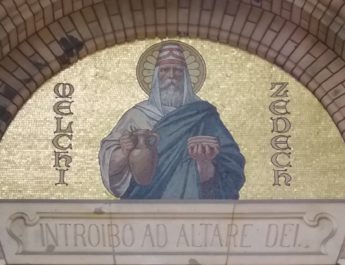Hebrews 2:10-18
Christmastide A5
10 It was fittingA that God,B for whom and through whom all things exist, in bringingC many children to glory,D should make the pioneerE of their salvationF perfectG through sufferings.H 11 For the one who sanctifiesI and those who are sanctified all have one Father.J For this reasonK Jesus is not ashamedL to call them brothersM and sisters, 12 saying,
“I will proclaimN your nameO to my brothers and sisters,
in the midst of the congregation I will praiseP you.”
13 And again,
“I will put my trustQ in him.”
And again,
“HereR am I and the childrenS whom GodT has given me.”
A “it was fitting” = prepo. 7x in NT. This is fitting, proper, or suitable – what is right. Properly, this means towering up or being noticeable. So, this is that which is quite obviously the proper thing (it stands out as proper).
B “God” = autos. Literally “he.”
C “bringing” = ago. This can mean bring, but it can also mean lead, guide, or carry. It is the root of the word for “angel” in Greek.
D “glory” = doxa. From dokeo (to have an opinion, seem, appear, suppose; a personal judgment; to think); from dokos (opinion). This is literally something that evokes a good opinion – something that connects to our understanding of intrinsic worth. The ultimate expression of this is, of course, God and God’s manifestation. So, this is opinion, honor, and dignity, but also praise, glory, renown, and worship.
E “pioneer” = archegos. Related to “bringing” in v10. 4x in NT. From archo (to rule, begin, reign – first in political power or position) + hegeomai (to lead, think, consider; properly, leading the way – the one who goes at the front like a chief does; one who commands in an official capacity; can also refer to a leading authority or a predominant thought) [from ago (see note C)]. This is founder, leader, or pioneer. It is the one who comes first, clearing the way for others to follow. It has the sense of an originator who begins a movement and continues to lead it.
F “salvation” = soteria. From soter (savior, deliverer, preserver); from sozo. (to save, heal, preserve, or rescue. Properly, this is taking someone from danger to safety. It can be delivering or protecting literally or figuratively.); from sos (safe, rescued, well). This is salvation, deliverance, welfare, preservation, or safety. “Soteriology” is the area of theology that deals with doctrines of salvation and is taken from this root.
G “make…perfect” = teleioo. From teleios (complete in the sense of reaching the end, being full grown – complete stage by stage or part by part; can be translated mature or perfect, but in the sense of completeness and not in the sense of perfectionism); from telos (end, aim, purpose; consummation, outcome, result); from tello (to set out for a definite place or goal). This is to bring to an end, complete, finish, accomplish, reach a goal, perfect. Can be used for finishing a race or accomplishing a prediction. Can be used for completing processes or phases of a project. Spiritually, it can mean to consecrate or fulfill.
H “sufferings” = pathema. 16x in NT –8x of Christ’s suffering, 6x of suffering as a Christian, and 2x of sinful passion. From pathos (what happens to you; a passion or suffering; can be an emotion generally or a raw, powerful feeling; can be used of lust or depraved impulses); from pascho (to suffer or endure; technically, this means being acted on for good or for bad, but it generally used for ill treatment or suffering; it refers to strong emotions). This is suffering, affliction, passion, an undergoing, feeling agony or strong desire, a hardship or pain.
I “sanctifies” = hagiazo. From hagios (holy, sacred, pure ethically, ritually, or ceremonially; prepared for worship, chaste, unadulterated, pure to the core; undefiled by sin; figurative for innocent, modest, perfect). This is to make or treat as holy, consecrate, hallow, sanctify, purify, dedicate. To make holy in a ritual sense or mentally to venerate.
J “all have one Father” = ek + heis + pas. Literally “from one all” or “from out of one all.” The word “father” is not used in Greek.
K “reason” = aitia. From aiteo (to ask, petition, demand, beg, crave). This is a motive, cause, excuse, or charge. It can be a crime, charge, or accusation – a case or the guilt in a case. Properly, this is a cause or reason as that which one asks for in order to understand.
L “ashamed” = epaischunomai. 11x in NT. From epi (on, upon, fitting) + aischuno (to dishonor, make ashamed, shrink, be put to shame) [from aischos (shame, disgrace, disfigurement)]. Properly, this is to be disgraced or personally humiliated. This is a shame that comes on someone that is warranted (i.e. commensurate with an error or wrong that they have done). Here, the shame is personal and due to error or falling away.
M “brothers” = adelphos. From a (with; denotes fellowship) + delphus (womb). This is brother literal or figurative. Properly, this is one who shares a womb with you. Can also be used for a fellow Christian.
N “proclaim” = apaggello. Related to “bringing” & “pioneer” in v10. From apo (from, away from) + aggello (to announce, report, bring news) [from aggelos (to bring tidings); from ago (see note C)]. This is to report, announce, declare, bring word. This is proclaiming, which focuses on the source of the report or the content of that report.
O “name” = onoma. May be from ginosko (know, recognize, learn from firsthand experience). This is a name, authority, cause, character, fame, reputation. The name was thought to include something of the essence of the person so it was not thought to be separate from the person.
P “praise” = humneo. 4x in NT. From humnos (hymn, sacred song in praise of God; also used to celebrate pagan gods, heroes, or conquerors); from hudeo (to celebrate). This word is to sing hymns to, praise, laud – to celebrate God. This is the root verb that the English “hymn” comes from.
Q “trust” = peitho. To persuade, have confidence, urge. This is being convinced by argument, evidence, or authority. Can also mean relying on with inward certainty. This is where the Greek word for faith (“pistis”) is drawn from.
R “here” = idou. From eido (to be away, see, know, remember, appreciate). This is see! Lo! Behold! Look! Used to express surprise and or draw attention to the statement.
S “children” = paidion. From pais (child, youth, servant, slave); perhaps from paio (to strike or sting). This is a child as one who is still being educated or trained. Perhaps one seven years old or younger. Used figuratively for an immature Christian.
T “God” = theos. From Proto-Indo-European origins, meaning do, put, place. This is God or a god in general.
14 Since, therefore, the children shareU flesh and blood,V he himself likewiseW sharedX the same things, so that through death he might destroyY the one who has the powerZ of death, that is, the devil,AA 15 and freeBB those who all their lives were held in slaveryCC by the fearDD of death. 16 For it is clear that he did not come to helpEE angels,FF but the descendantsGG of Abraham.HH 17 Therefore he had toII become like his brothers and sisters in every respect, so that he might be a mercifulJJ and faithfulKK high priest in the service of God, to make a sacrifice of atonementLL for the sinsMM of the people.NN 18 Because he himself was testedOO by what he suffered,PP he is ableQQ to helpRR those who are being tested.
U “share” = koinoneo. 8x in NT. From koinonos (sharer, partner, companion, associate; someone who shares fellowship as a joint participant – looks at the relational aspect); from koinos (common or shared; in the Hebraistic sense, this is common in contrast to sacred. So it would be profane or unclean). This is to have a share in or have fellowship with, to contribute or participate.
V “flesh and blood” = haima + kai + sarx. Literally “blood and flesh.” Sarx may be from saroo (to sweep, cleanse by sweeping); from sairo (to brush off). This is flesh, the body, human nature, materiality, kindred. Flesh is not always evil in scripture (as when it refer to Jesus taking on a human body). However, it is generally used in a negative way for actions made selfishly and not through faith. This can mean animal flesh, i.e. meat, or refer to body in contrast to soul/spirit. Flesh can be a way of talking about how things or people are related or talking about human frailty (physical or moral).
W “likewise” = paraplesios. 1x in NT. From para (by, close beside) + the same as plesion (near, neighboring, nearby, friend). This is similarly or in like manner.
X “shared” = metecho. 8x in NT. Different from “share” in v14. From meta (with, which implies change from the contact or relationship) + echo (to have, hold, possess). This is to partake of, share in, participate in. By implication of sharing/belonging, it can imply eating or drinking.
Y “destroy” = katargeo. From kata (down, according to, against) + argeo (to be idle, delay, be motionless or at rest) [from a (not) + ergon (work, task, action, employment)]. This is to make something inactive or idle, to abolish or annul, to make something powerless or ineffective.
Z “power” = kratos. 12x in NT. This is power as exerted; vigor in a literal or figurative sense. It can be strength, might, dominion, or mighty deeds.
AA “devil” = diabolos. From diaballo (to bring charges, usually maliciously; this is to slander, complain of, or accuse. In literal terms, it is throwing something back in forth whether tangibly or figuratively as with words, i.e. slander or gossip) [from dia (through, across, thoroughly) + ballo (to throw, cast, place, put, drop)]. This is properly one who slanders or accuses falsely. This word was commonly used to refer to a backbiter – making charges just to bring down someone else. Used in the NT to refer to the Slanderer, the Devil.
BB “free” = apallasso. 3x in NT. From apo (from, away from) + allasso (to change, exchange, transform) [from allos (other, another, different)]. This is to free someone, to change and so to release. It can also mean depart or deliver.
CC “slavery” = douleia. 5x in NT. From douleo (to be a slave, to serve, obey, be subject to. This is slavery whether voluntary or involuntary, literal or figurative); from doulos (slave, servant); from deo (to tie, bind, fasten, impel, compel; to declare something against the law or prohibited). This is slavery or bondage.
DD “fear” = phobos. From phebomai (to flee, withdraw, be put to flight). This is panic flight, fear, fear being caused, terror, alarm, that which causes fear, reverence, respect);
EE “help” = epilambanomai. 19x in NT. From epi (on, upon) + lambano (to take actively or receive by choice; generally not passive or violent). This is to lay hold of, seize, catch, or help. It can be used in a positive or hostile sense. It emphasizes the choice to lay hold of someone or something. So, it can be to seize in order to help or harm or for any other reason in a literal or figurative sense. This word is used when Jesus catches Peter after he tries to walk on water (Mk 14:31) and also for when Paul was arrested (Acts 16:19)
FF “angels” = aggelos. Probably from ago (to lead, bring, carry, guide) + agele (flock, herd, drove) [also from ago (lead, bring, carry, guide)]. This is angel or messenger. Properly, it is one sent with news or to perform a specific task. This messenger can be human or an angel from heaven. More commonly, it is used for angels in the New Testament.
GG “descendants” = sperma. From speiro (to sow seed, to scatter); perhaps from spao (to draw as one draws a sword). This is a thing that is sown so it can refer to literal seeds or to one’s offspring or descendants.
HH “Abraham” = abraam. From Hebrew Abraham (exalted father); [from ab (father) + rum (to be high or exalted, rise, extol)]. Abraham is exalted father or father of many nations.
II “had to” = opheilo. May be from the base of ophelos (help, gain; something heaped up i.e. an advantage); from ophello (heap together, accumulate, benefit). This is to owe, be obligated, or should. It is to be indebted and so obligated to make good on a debt. It can be used in a moral or legal sense (originally from the legal arena to speak of legal and economic responsibilities). Later used to describe what one owes morally or ethically to the gods (for pagans) or God (for Christians) and to other people. In the NT, this word described ethical duty.
JJ “merciful” = eleemon. 2x in NT. From eleeo (to have pity or mercy on, be compassionate in word or deed; often used for grace); from eleos (mercy, pity, compassion, whether from God or humans). This is merciful or full of pity. It speaks of compassion in an active sense.
KK “faithful” = pistos. From peitho (to have confidence, urge, be persuaded, agree, assure, believe, have confidence, trust). This is faithful – loyalty, being trustworthy or true, believing, reliable.
LL “make a sacrifice of atonement” = hilaskomai. 2x in NT. From hilaos (propitious, gracious); may be from haireomai (to choose, take, prefer); perhaps from airo (to lift, take away, remove – corresponding to Hebrew nasa, which also means “lift” and is used for forgiving sin). This is to have mercy on or show favor to, to forgive, pardon, be merciful, make reconciliation for. This is atoning for sin.
MM “sins” = hamartia. From hamartano (to miss the mark, do wrong, make a mistake, sin). Hamartano is from a (not) + meros (a part or share). Literally, this means not having one’s share or portion – like not receiving inheritance or what was allotted to you. This word means missing the mark so it is used for guilt, fault, and acts of sin.
NN “people” = laos. This is the people or crowd – often used for the chosen people. This is where the word “laity” comes from.
OO “tested” = peirazo. From peira (trial, experiment, attempt, experience); from peiro (to pierce). This is to test something, to scrutinize or assay it. It can be used for examining, proving, enticing, or disciplining.
PP “suffered” = pascho. Related to penthos (mourning, sorrow, grief). This is to feel a heavy feeling, particularly used for suffering. It is to be acted on – can be for good or ill, but generally ill treatment. This is the root where the term “paschal lamb” comes from.
QQ “able” = dunamai. This is to be able, to have power or ability. The noun from this root is used to mean miracle (i.e. deeds of power).
RR “help” = boetheo. Different from “help” in v16. From boethos (helping, helper; this is specifically the help needed for an urgent, real need); [may be from boe (cry, call for help – perhaps mimicking the sound of a heartfelt cry for help) + theo (to run)]. Properly, this refers to one who runs in order to provide urgent help to one who desperately needs it. It was originally used in military settings.
Image credit: “Christ in Limbo” by Fra. Angelico, between 1441 and 1442.




